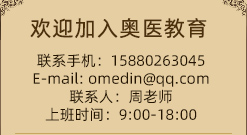| |
|
|
|
 |
在线QQ:
 |
|
|
|
|
|
|
|
|
|
《ISPN学习》总第551期
日期:2019-11-23 18:46:22
《ISPN学习》2019年10月28日总第551期
相识是缘,相知是福;
风雨兼程,不忘初心;
有您相伴,奥医感恩。
From the Programs
(From the Programs [课程选粹]栏目登载奥医及网络课程材料精选,旨在帮助读者了解ISPN/NCLEX-RN考试复习课程内容,并加深对考试相关内容的学习、掌握[课程详情见网站或点击阅读原文]。您的需要就是我们的努力方向。谢谢)
| 想提高专业英语听力吗?想边练听力边增加护理专业知识吗?《Listening -- Elementary》(专业英语听力 – 初级)可助你一臂之力。 |
ISPN Review
Nursing Considerations
护理考虑
Here are important nursing considerations when administering anthelmintics:
以下为使用抗蠕虫药时应考试的重要护理问题
A. Nursing Assessment
护理评估
These are the important things the nurse should include in conducting assessment, history taking, and examination:
护理在实施护理评估、病史采集和体格检查时应包含的重要内容:
1. Assess for the mentioned cautions and contraindications (e.g. known allergies, hepatorenal dysfunction, pregnancy and lactation, etc.) to prevent any untoward complications.
2. Perform a thorough physical assessment (other medications taken, reflexes and muscle strength, skin color, temperature, texture, etc.) to establish baseline data before drug therapy begins, to determine effectiveness of therapy, and to evaluate for occurrence of any adverse effects associated with drug therapy.
3. Assess the patient’s liver function, including liver function tests to determine appropriateness of therapy and to monitor for toxicity.
4. Obtain a culture of stool for ova and parasites to determine the infecting worm and establish appropriate treatment.
5. Assess the abdomen to evaluate for any changes from baseline related to the infection, identify possible adverse effects, and monitor for improvement.
1、评估有无上面提到的注意事项和禁忌症(如,已知过敏史,肝肾功能障碍,妊娠哺乳等),预防任何不利并发症。
2、进行彻底的身体评估(是否服用其他药物,反射和肌肉力量,皮肤颜色,体温,质地等),在药物疗法开始前确立基线数据,确实疗法效果,评价任何药物疗法相关不良效应发生率。
3、评估患者肝功能,包括肝功能试验以确定疗法是否合适,监测毒性。
4、获取粪便虫卵和寄生虫培养,确定感染蠕虫,确立合适疗法。
5、检查腹部,对照基线数据,评估有无感染相关变化,确认可能的不良效应,监测是否改善。
B. Nursing Diagnoses
Here are some of the nursing diagnoses that can be formulated in the use of these drugs for therapy:
1. Acute pain related to GI, CNS, and skin effects of the drug
2. Imbalanced nutrition: less than body requirements related to GI effects of the drug
B. 护理诊断
进行药物疗法时可能形成的护理诊断如下:
1、急性痛,与药物的GI、CNS和皮肤效应相关
2、营养失调:低于身体需要,与药物的GI效应相关
C. Implementation with Rationale
These are vital nursing interventions done in patients who are taking anthelmintics:
1. Arrange for appropriate culture and sensitivity tests before beginning therapy to ensure proper drug for susceptible Plasmodium species.
2. Administer the complete course of the drug to get the full beneficial effects.
3. Monitor hepatic function and perform ophthalmological examination before and periodically during treatment to ensure early detection and prompt intervention with cessation of drug if signs of failure or deteriorating vision occur.
4. Provide comfort and safety measures if CNS effects occur (e.g. side rails and assistance with ambulation if dizziness and weakness are present) to prevent patient injury. Provide oral hygiene and ready access to bathroom facilities as needed to cope with GI effects.
5. Educate client on drug therapy to promote understanding and compliance.
C. 实施及原理说明
抗蠕虫药使用患者护理措施如下:
1、开始疗法前,先安排适当的培养和敏感性试验,确保易感疟原虫属药物适当
2、用药疗程完整,获得充分效果
3、治疗前及治疗期间,监测肝功能,实施眼科检查,确保视力衰退或恶化症状出现时能及时发现,迅速采取措施停药
4、若出现CNS效应,提供安慰及安全措施(如有头晕、无力时,抬高床栏,协助行走),防止患者受伤。必要时,提供口服卫生和浴室使用便利,应对GI效应
5、对患者进行药物疗法教育,促进理解和顺从性
D. Evaluation
Here are aspects of care that should be evaluated to determine effectiveness of drug therapy:
1. Monitor patient response to therapy (resolution of helminth infestation and improvement in signs and symptoms).
2. Monitor for adverse effects (e.g. orientation and affect, nutritional state, skin color and lesions, hepatic function, and reports of abdominal discomfort and pain, etc).
3. Evaluate patient understanding on drug therapy by asking patient to name the drug, its indication, and adverse effects to watch for.
4. Monitor patient compliance to drug therapy.
D. 评价
确定药物疗法效果时需要评价的护理内容如下:
1、监测患者对疗法的响应情况不(蠕虫感染的缓解,症状体征的改善)。
2、监测有无不良效应(如定向障碍,情感变化,营养状况,皮肤颜色和损伤,肝功能,腹部不适及疼痛报告,等)。
3、要求患者说出药物名称、适应症及需要观察的不良效应,评价患者对药物疗法的理解情况。
4、监测患者对药物疗法的顺从性。
Vocabulary for Today
muscle strength – 肌肉强度,肌力
texture – n. 质地
appropriateness – n. 适当性
plasmodium – n. 疟原虫属
resolution – n. 缓解,解决
| 尽快地从茫然中理清复习思路,准确地抓住复习重点,这是每一个考试复习者的一大愿望。“ISPN考试复习要点提示”即是帮您实现这一愿望的利器!该教程已在www.omedin.com陆续上线。 |
Video
Helminth and Immunity 2
Test
1. Before a child’s hospital discharge, a nurse is teaching the parents how to administer an oral medication to the child. Which nurse instruction would be most appropriate?
A. Administer the medication and then follow it with a small glass of milk
B. Give the child a flavored ice pop just before the medication
C. Tell the child that the medication will taste good
D. Open all capsules and mix the contents with applesauce
2. An experienced nurse is supervising a new registered nurse who is administering medications to adult clients. Which action by the new registered nurse requires the experienced nurse to intervene?
A. Withdraws 1 mL of purified protein derivative (PPD) from a vial for intradermal injection
B. Pinches the abdominal tissue of a thin adult and inserts the needle at a 45-degree angle to administer insulin subcutaneously
C. Measures three finger-breadths below the acromion process to inject codeine 15 mg/0.5 mL in the deltoid muscle
D. Administers 5,000 units heparin subcutaneously in the abdomen without aspirating for a blood return
(本期答案见页底)
本期ISPN Review答案:
1. B. Give the child a flavored ice pop just before the medication.
The cold from the ice pop will help to numb the taste buds and weaken the taste of the medication. Options 1, 3, and 4 are incorrect. Essential foods, such as milk, should be avoided because the child may later refuse the food that he/she associates with the medicine. If the child is old enough, warn the child that the medication is objectionable, but then praise the child after the medication is swallowed. Some capsules are extended release and should not be opened.
2. A. Withdraws 1 mL of purified protein derivative (PPD) from a vial for intradermal injection.
Only small amounts are administered in intradermal injections, usually no more than 0.1 mL. Options 2, 3, and 4 demonstrate the correct procedures for administering the medications by other routes.
上一篇:《ISPN学习》总第550期
下一篇:《ISPN学习》总第552期
|
|
 |
| |
|
|
